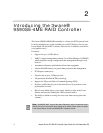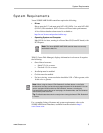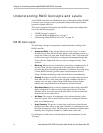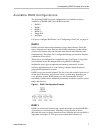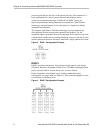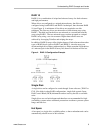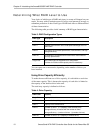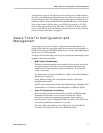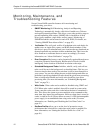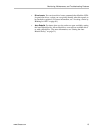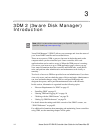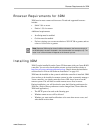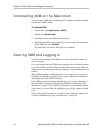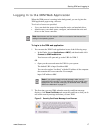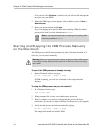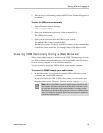
Chapter 2. Introducing the 3ware® 9590SE-4ME RAID Controller
12 3ware Serial ATA RAID Controller User Guide for the Power Mac G5
Monitoring, Maintenance, and
Troubleshooting Features
Several 3ware RAID controller features aid in monitoring and
troubleshooting your drives.
•
SMART Monitoring (Self-Monitoring, Analysis and Reporting
Technology) automatically checks a disk drive's health every 24 hours
and reports potential problems. This allows you to take proactive steps to
prevent impending disk crashes. SMART data is checked on all disk
drives (array members, single disks, and hot spares). Monitoring of
SMART thresholds can be turned on and off in 3DM. (For details, see
“Viewing SMART Data About a Drive” on page 67.)
•
Verification. The verify task verifies all redundant units, and checks for
media errors on single disks, spares, and RAID 0 unit members. If the
disk drive is part of a redundant unit, error locations that are found and are
deemed repairable are rewritten with the redundant data. This forces the
drive firmware to reallocate the error sectors accordingly. (For more
information, see “About Verification” on page 70.)
•
Error Correction. Bad sectors can be dynamically repaired through error
correction (Dynamic Sector Repair). Reallocation of blocks is based
intelligently on the location of the block in relation to the stripe.
•
Scheduled Background Tasks. Initialize, rebuild, verify, and self-test
tasks can all be run in the background, at scheduled times. This lets you
choose a time for these tasks to be run when it will be least disruptive to
your system. You can also define the rate at which background tasks are
performed, specifying whether I/O tasks should be given more processing
time, or background rebuild and verify tasks should be given more
processing time. (For more information, see “Scheduling Background
Tasks” on page 76.)
•
Write Cache. Write cache can be enabled or disabled using 3DM 2 and
CLI. When write cache is enabled, data will be stored in system cache,
3ware controller cache, and drive cache before the data is committed to
disk. This allows the system to process multiple write commands at the
same time, thus improving performance. However when data is stored in
cache, it could be lost if a power failure occurred. A UPS (uninterruptable
power supply) is recommended when using write cache. (For more
information, see “Enabling and Disabling the Unit Write Cache” on
page 45.)
•
StorSave Profiles allow you to set the level of protection versus
performance that is desired for a unit when write cache is enabled (For
more information, see “Setting the StorSave Profile for a Unit” on
page 48.)



